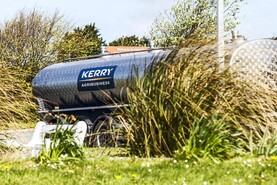It was yet another year of solid and consistent performance for global ingredients and flavours company Kerry Group.
Despite a currency headwind of 5%, the group still managed to deliver profit growth (earnings per share) of 7.1%. This was driven by a 3.6% increase in volumes which helped to push trading margins beyond 12%. The business also threw off €570m in cash during the year. This was all against a market backdrop which remained seriously competitive, developing markets which saw continued geopolitical issues and less than buoyant economic conditions in developed markets.
Revenues remained largely unchanged at €6.1bn, with taste and nutrition, Kerry’s ingredients division, driving the performance.
Acquisitions
Compared with 2015, when the Kerry Group spent almost €1bn acquiring businesses, 2016 was relatively quiet where it spent less than €100m. At year end 2015, it had a net debt:EBITDA ratio of 1.9 times. However, given the strong cash generated in 2016, at the year end this ratio had reduced to 1.5 times, which is well within the group covenants of 3.5 times. This would indicate that the group could spend around €880m on acquisitions if required in the near term. McCarthy said the group would be more acquisitive in 2017, with the room to spend between €100m and €1bn if the right opportunity arises.
During the year the group invested €260m in research and innovation which has proven to be one of the key strengths of the group. Given that it has 140 plants globally, with 25 in the UK and a further 20 in Europe McCarthy said that Kerry is well positioned to deal with the potential challenges that Brexit may bring.
The board recommended a final dividend of 39.2 cent per share, an increase of 12% on the final 2015 dividend. Together with the interim dividend of 16.8 cent per share, this brings the total dividend for the year to 56 cent, an increase of 12% on 2015.
When pressed on the future of the consumer foods division, McCarthy said: “Kerry Group has no plans to sell its consumer foods business. It’s a very cash generative business and delivers good return on capital. We are very satisfied with anything over 2% growth in this type of business.”
Shares in Kerry Group were up 7% in the week at €72.50 at close of business on Tuesday.
Taste and nutrition: Revenues €4.9bn (?3.5%)
This division, which now accounts for 80% of the business, reported a 4% growth in volumes, expanded margins 60 bps to 14.7% and delivered an 8.1% rise in profits to reach €716m. This performance was boosted by a 5.4% volume growth during the last quarter. Lower raw material pricing saw price deflation of 2.1%.
While the Americas region is the most important in terms of sales and delivered 3.9% volume growth, it was Asia-Pacific that delivered the strongest volume growth of 10.7%. In comparison, the European (including Middle East and African) markets saw little or no growth (0.7%) during 2016. In recent years Kerry has invested heavily in the Asia-Pacific region and while it is a relatively small part of the business, accounting for as little as 16% of the ingredient business, it is expected to play a much larger role into the future. One of the key aspects of the weaker performance in the European and Middle East market, which accounts for 30% of the ingredients business, was the deflationary environment which made the market highly competitive.
The Americas region, which accounts for 54% of the ingredients business, recorded strong growth in sales of 12% to €2.6bn driven by good growth in core markets in North America along with improved performance in Latin America.
Consumer foods:
Revenues €1.3bn (?9.7%)
The consumer foods division, which accounts for around 20% of the business, dragged performance, with profits falling 6.7% to €117m due mainly to currency headwinds and the impact of the sale of non-core investments.
Margins expanded 30bps to 8.8% as a result of better positioning of the product portfolio. Volume growth of 2.1% was satisfactory given the competitive and challenging market. However, this growth was offset by falling prices (down 2%).
This is a particularly solid performance given the uncertainty and sterling devaluation which followed the Brexit vote.
Read more
Glanbia reports 13% increase in profits to €350m
Editorial: Kerry and Glanbia making moves
It was yet another year of solid and consistent performance for global ingredients and flavours company Kerry Group.
Despite a currency headwind of 5%, the group still managed to deliver profit growth (earnings per share) of 7.1%. This was driven by a 3.6% increase in volumes which helped to push trading margins beyond 12%. The business also threw off €570m in cash during the year. This was all against a market backdrop which remained seriously competitive, developing markets which saw continued geopolitical issues and less than buoyant economic conditions in developed markets.
Revenues remained largely unchanged at €6.1bn, with taste and nutrition, Kerry’s ingredients division, driving the performance.
Acquisitions
Compared with 2015, when the Kerry Group spent almost €1bn acquiring businesses, 2016 was relatively quiet where it spent less than €100m. At year end 2015, it had a net debt:EBITDA ratio of 1.9 times. However, given the strong cash generated in 2016, at the year end this ratio had reduced to 1.5 times, which is well within the group covenants of 3.5 times. This would indicate that the group could spend around €880m on acquisitions if required in the near term. McCarthy said the group would be more acquisitive in 2017, with the room to spend between €100m and €1bn if the right opportunity arises.
During the year the group invested €260m in research and innovation which has proven to be one of the key strengths of the group. Given that it has 140 plants globally, with 25 in the UK and a further 20 in Europe McCarthy said that Kerry is well positioned to deal with the potential challenges that Brexit may bring.
The board recommended a final dividend of 39.2 cent per share, an increase of 12% on the final 2015 dividend. Together with the interim dividend of 16.8 cent per share, this brings the total dividend for the year to 56 cent, an increase of 12% on 2015.
When pressed on the future of the consumer foods division, McCarthy said: “Kerry Group has no plans to sell its consumer foods business. It’s a very cash generative business and delivers good return on capital. We are very satisfied with anything over 2% growth in this type of business.”
Shares in Kerry Group were up 7% in the week at €72.50 at close of business on Tuesday.
Taste and nutrition: Revenues €4.9bn (?3.5%)
This division, which now accounts for 80% of the business, reported a 4% growth in volumes, expanded margins 60 bps to 14.7% and delivered an 8.1% rise in profits to reach €716m. This performance was boosted by a 5.4% volume growth during the last quarter. Lower raw material pricing saw price deflation of 2.1%.
While the Americas region is the most important in terms of sales and delivered 3.9% volume growth, it was Asia-Pacific that delivered the strongest volume growth of 10.7%. In comparison, the European (including Middle East and African) markets saw little or no growth (0.7%) during 2016. In recent years Kerry has invested heavily in the Asia-Pacific region and while it is a relatively small part of the business, accounting for as little as 16% of the ingredient business, it is expected to play a much larger role into the future. One of the key aspects of the weaker performance in the European and Middle East market, which accounts for 30% of the ingredients business, was the deflationary environment which made the market highly competitive.
The Americas region, which accounts for 54% of the ingredients business, recorded strong growth in sales of 12% to €2.6bn driven by good growth in core markets in North America along with improved performance in Latin America.
Consumer foods:
Revenues €1.3bn (?9.7%)
The consumer foods division, which accounts for around 20% of the business, dragged performance, with profits falling 6.7% to €117m due mainly to currency headwinds and the impact of the sale of non-core investments.
Margins expanded 30bps to 8.8% as a result of better positioning of the product portfolio. Volume growth of 2.1% was satisfactory given the competitive and challenging market. However, this growth was offset by falling prices (down 2%).
This is a particularly solid performance given the uncertainty and sterling devaluation which followed the Brexit vote.
Read more
Glanbia reports 13% increase in profits to €350m
Editorial: Kerry and Glanbia making moves






 This is a subscriber-only article
This is a subscriber-only article










SHARING OPTIONS: